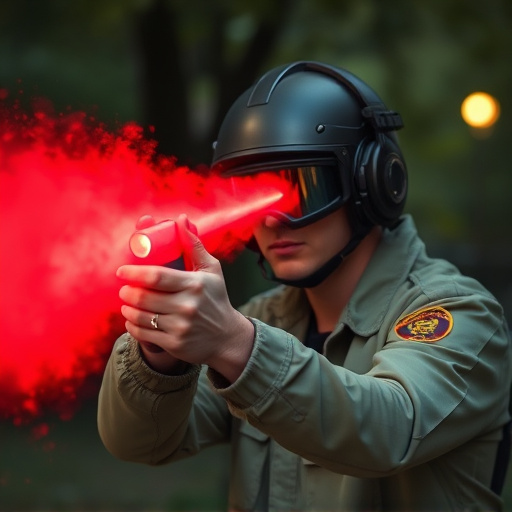Non-lethal deterrents like pepper spray offer individuals powerful tools for personal security by temporarily incapacitating threats without permanent harm. While pepper spray isn't designed to cause permanent blindness, its effectiveness depends on factors like distance, wind, and the attacker's gear. Understanding its limitations and proper use is crucial for effective self-defense and avoiding legal issues. Staying informed about local laws and employing these tools responsibly complements situational awareness and de-escalation techniques for a comprehensive personal security strategy.
“Personal security is a growing concern in today’s world, prompting the exploration of non-lethal deterrent devices. This article offers a comprehensive overview of such tools, focusing on pepper spray as a popular choice. We’ll dispel common myths, including the misconception that it can blind you, and explore its advantages and limitations.
Additionally, we’ll delve into legal considerations, emphasizing responsible usage, ensuring readers are equipped with knowledge in this dynamic realm of personal safety.”
- Understanding Non-Lethal Deterrent Devices: A Comprehensive Overview
- The Role of Pepper Spray: Blindness Myth Debunked
- Advantages and Limitations: Weighing the Effectiveness of Non-Lethal Weapons
- Legal Considerations and Personal Safety: Using These Devices Responsibly
Understanding Non-Lethal Deterrent Devices: A Comprehensive Overview
Non-lethal deterrent devices, also known as less-lethal weapons or tools, have gained significant attention in recent years as a preferred method for personal security and law enforcement. These innovative tools are designed to incapacitate or deter individuals without causing permanent harm or death, unlike traditional lethal force. One of the most common types is pepper spray, which can temporarily blind and disorient an attacker by irritating the eyes, nose, and throat. However, it’s essential to understand that while pepper spray can provide a crucial window for escape, it does not guarantee blindness; its effectiveness depends on factors like distance, wind direction, and the amount of spray used.
These non-lethal devices offer individuals a sense of empowerment, especially in potentially dangerous situations. They empower people to protect themselves without resorting to lethal force. From pepper spray canisters to stun guns and taser devices, each tool has its unique mechanism to ensure safety while deterring potential threats. This comprehensive overview aims to demystify these devices, highlighting their capabilities and limitations, so users can make informed decisions regarding personal security.
The Role of Pepper Spray: Blindness Myth Debunked
Pepper spray has long been a staple in personal security devices, marketed as a non-lethal deterrent to protect against physical attacks. One common misconception about pepper spray is that it can cause permanent blindness. However, this claim is largely unfounded. While pepper spray does cause temporary blindness and severe irritation, the effects are not permanent. The active ingredient, capsaicin, irritates the eyes by binding to pain receptors, leading to a burning sensation and reduced visibility. But with proper eye washing after exposure, most users can regain their vision within minutes.
Understanding that pepper spray is not designed to cause blindness is crucial for its effective use. It’s an important clarification to dispel fear and misinformation surrounding these devices. Knowing the reality of its effects empowers individuals to make informed decisions about personal safety and choose the right non-lethal deterrent for their needs, without misconceptions clouding their judgment.
Advantages and Limitations: Weighing the Effectiveness of Non-Lethal Weapons
Non-lethal weapons, such as pepper spray, offer a range of advantages in personal security. They provide individuals with a means to deter and incapacitate potential threats without causing permanent harm or death. Pepper spray, for instance, can disrupt an attacker’s vision and breathing, giving the user valuable time to escape or call for help. This is particularly beneficial in situations where lethal force might not be justified or desired, such as self-defense within a crowd or against an unpredictable aggressor.
However, there are limitations to consider when it comes to non-lethal deterrents. One significant concern is their effectiveness against determined or armed attackers. Pepper spray may not always blind its target; its impact can vary based on factors like distance, wind, and the attacker’s protective gear. Moreover, some individuals may have a higher tolerance to pepper spray due to previous exposure, reducing its potency in certain scenarios. As such, while non-lethal weapons are valuable tools for personal security, they should be part of a comprehensive strategy that includes situational awareness, de-escalation techniques, and other self-defense measures.
Legal Considerations and Personal Safety: Using These Devices Responsibly
When considering a non-lethal deterrent for personal security, such as pepper spray, it’s crucial to understand the legal implications and use them responsibly. Pepper spray, while designed to incapacitate temporarily, can cause severe discomfort and even permanent damage if misused or used irresponsibly. For instance, direct inhalation can potentially lead to blindness, so it’s essential to aim for clothing or areas away from the face. Additionally, laws regarding pepper spray vary by jurisdiction; some regions have strict regulations on who can possess and use it, as well as where and when it can be employed.
Personal safety should always be a priority, but using these devices ethically is equally important. It’s vital to be aware of local laws and understand the capabilities and limitations of any non-lethal deterrent. Responsible use includes ensuring proper training, storing them securely, and only deploying them as a last resort when facing an imminent threat. Being informed and adhering to legal guidelines can help maintain personal safety while avoiding potential legal issues related to pepper spray usage.
Non-lethal deterrent devices, such as pepper spray, offer a crucial tool for personal security. While they have proven effective in deterring and incapacitating assailants without causing permanent harm, it’s essential to understand their limitations, particularly the myth that pepper spray can blind you. Responsible use, knowledge of legal considerations, and awareness of one’s surroundings are key to maximizing their benefits. By arming ourselves with information, we can better protect ourselves and navigate potentially dangerous situations more effectively.
